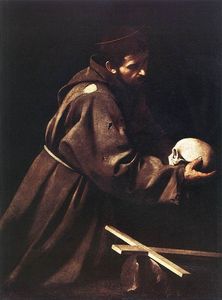Vir Dei Franciscus

Vir Dei Franciscus reliquit domum suam,
dimisit hereditatem suam,
inops et pauper factus est;
Dominus autem assumpsit eum.
Consider, for a moment, today’s Entrance Antiphon in the Roman Missal. What richness in so few lines! “The man of God, Francis, left his home, and gave up his inheritance, becoming poor and needy; the Lord however took him up.” In the Old Testament, the phrase, “man of God,” most often designates a prophet, one upon whom the Spirit of God has descended in a mighty rush, one authorized and sent to speak in God’s name. The liturgy presents Saint Francis as a “man of God,” a prophet, one sent to us with a message. (Saint Gregory the Great uses the same expression, vir Dei, in his life of Holy Father Benedict.) The “man of God” is not merely a holy man; he is a man seized by the Spirit of God, one in whose very bones the Word of God burns like a raging fire (cf. Jer 20:9).
The Entrance Antiphon goes on to say that Francis left home and gave up his inheritance; this tells us that, like Saint Anthony of Egypt before him, Francis was apostolic as well as prophetic. Saint Luke, describing the call of the apostles, says: “They left everything and followed Him” (Lk 5:11). Francis’ rupture with home and loved ones was spectacularly radical. “Brought before the bishop . . . he did not wait for any words nor did he speak any, but immediately putting off his clothes and casting them aside, he gave them back to his father. Moreover, not even retaining his trousers, his stripped himself completely naked before all” (Celano, First Life, 15).
Francis became “poor and needy.” The Latin words in the antiphon, —inops et pauper — are found in Psalm 85:1. “Turn your ear, O Lord, and give answer, for I am poor and needy.” One has to meditate the rest of Psalm 85 to discover what riches are implicit in this allusion of two little words. The whole psalm is placed in the mouth of Francis; it becomes his prayer and, today, can become ours. “Give joy to the soul of your servant, O Lord, for to you, I lift up my soul. . . . Your mercy to me has been great. . . . You console me and give me your help” (Ps 85: 4, 13, 17). I hear in the whole psalm the prayer of the poor and needy Francis.
The last phrase of the entrance antiphon is especially intriguing. “The Lord, however, took him up.” The expression is lifted directly from Psalm 26:10: Dominus autem assumpsit me. The sense of the Latin is, “The Lord adopted me, received me into his own house, lifted me up to himself.” Hear the resonance with Jesus’ own words in the gospel concerning the “childlike.” Only children, only the little and the poor are taken up into the Father’s house. To be taken up into the Father’s house is to discover oneself adopted and claimed by God as belonging to Him, not as slaves but as children. To be taken up into the Father’s house is to be given a share in the sonship of the First-Born, the Only-Begotten. Blessed Columba Marmion often spoke of our “becoming by grace what Christ is by nature.” In Christ we are beloved of the Father, cherished children at home in the household of God, little ones emboldened by the Holy Spirit to rest their heads on the Father’s bosom.
This was the experience of Saint Francis. Having left everything — position, security, privilege, and inheritance — to become utterly “minor,” without rank, without wealth, and, most painfully, without paternal approval — Francis found himself taken up into the household of the children of God, taken into the blessed company of “the poor, the maimed, the lame, and the blind” (Lk 14:13). Living there, in the intimacy of the First-Born, Francis came to resemble him more and more until, in the end, the Holy Spirit bore into his very flesh the identifying marks of Jesus crucified and risen.
“My father and mother have left me: but the Lord hath taken me up” (Ps 26:10). In every Eucharist we are “taken up” into the Father’s house, seated at his table, and fed with the Bread of Angels reserved for the children of the house. In every Eucharist, we are “taken up” into the mystery of Jesus crucified and risen, and we are wounded by love. Oh, to see these things through the eyes of the Church, that is, through the eyes of little children made bright by love! These are things hidden from “the wise and the clever and revealed to the childlike” (Mt 11:25). Francis, “man of God” and truly “catholic” man, help us to see as you saw, and seeing, to rejoice with a perfect joy.
